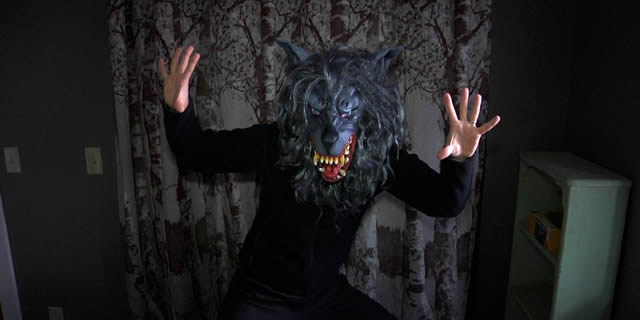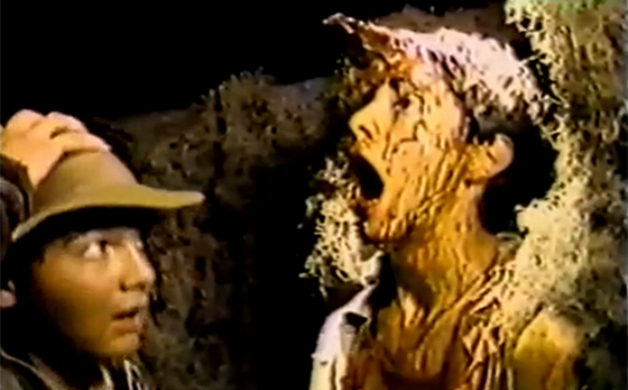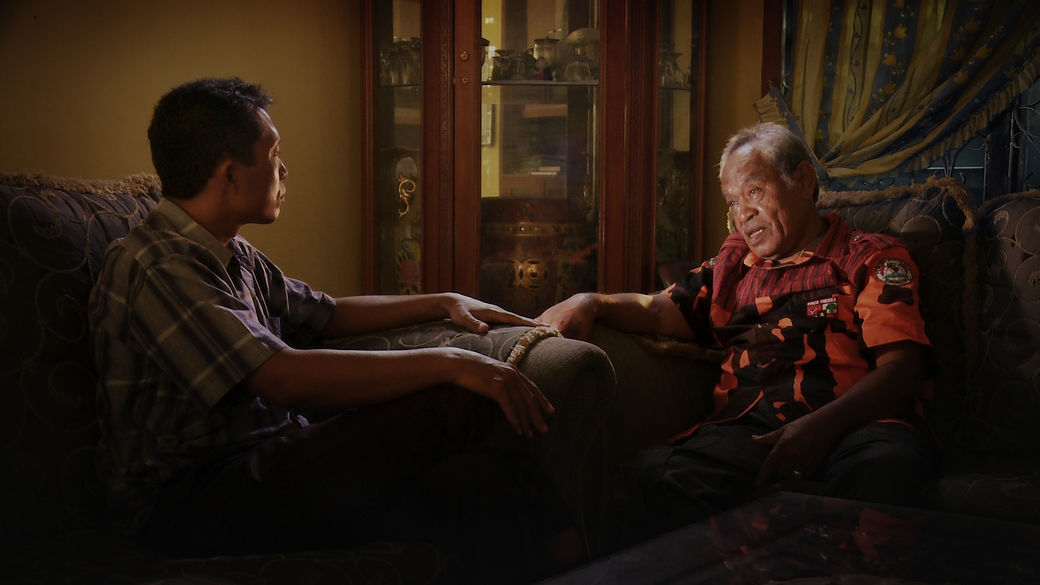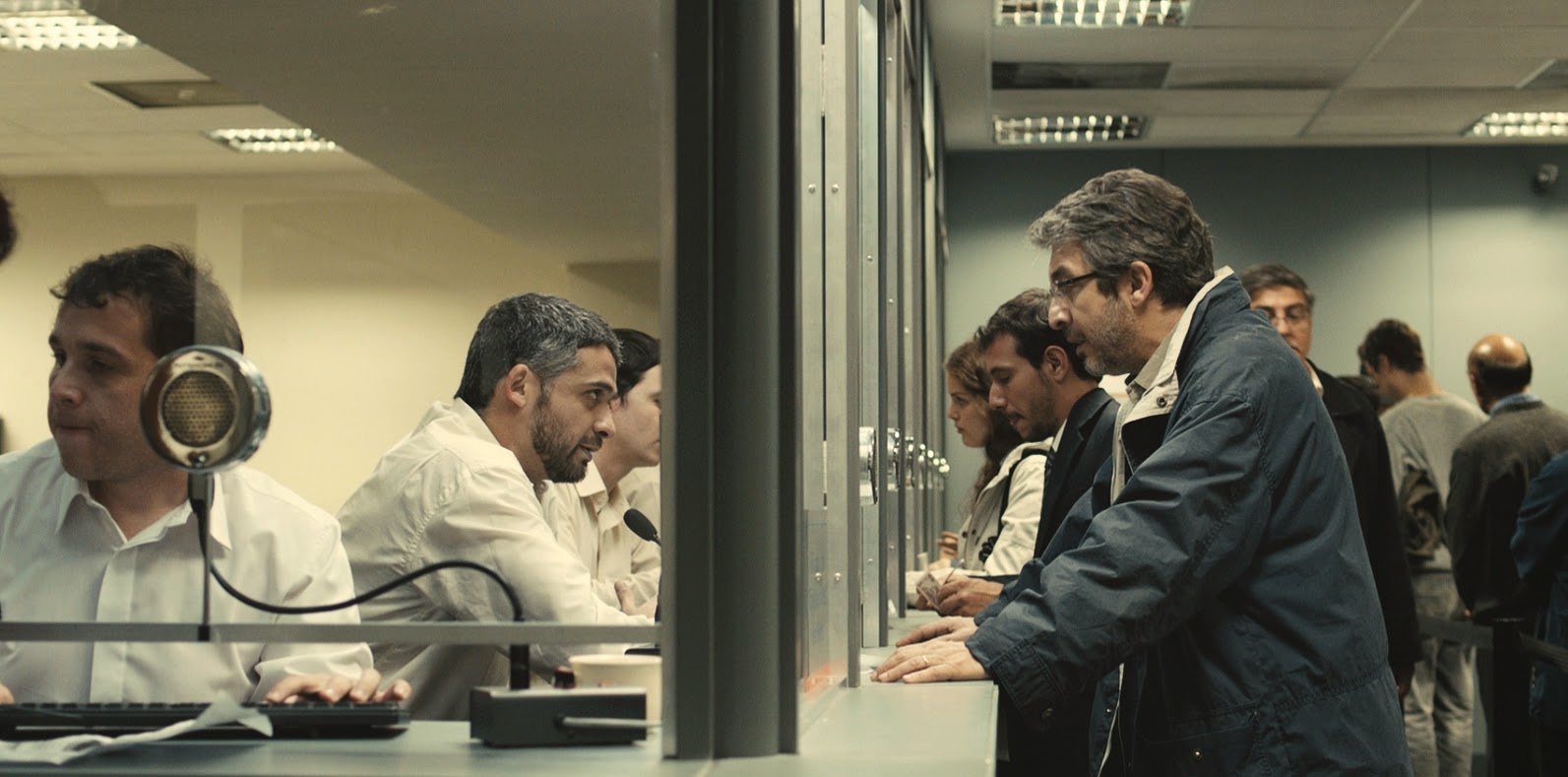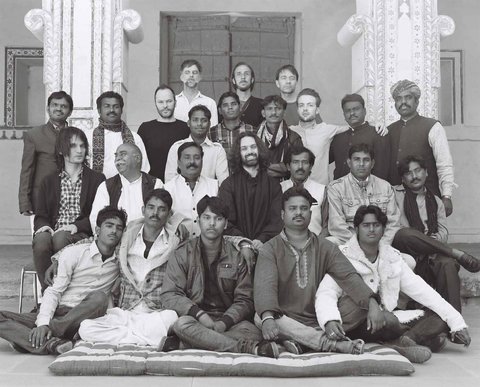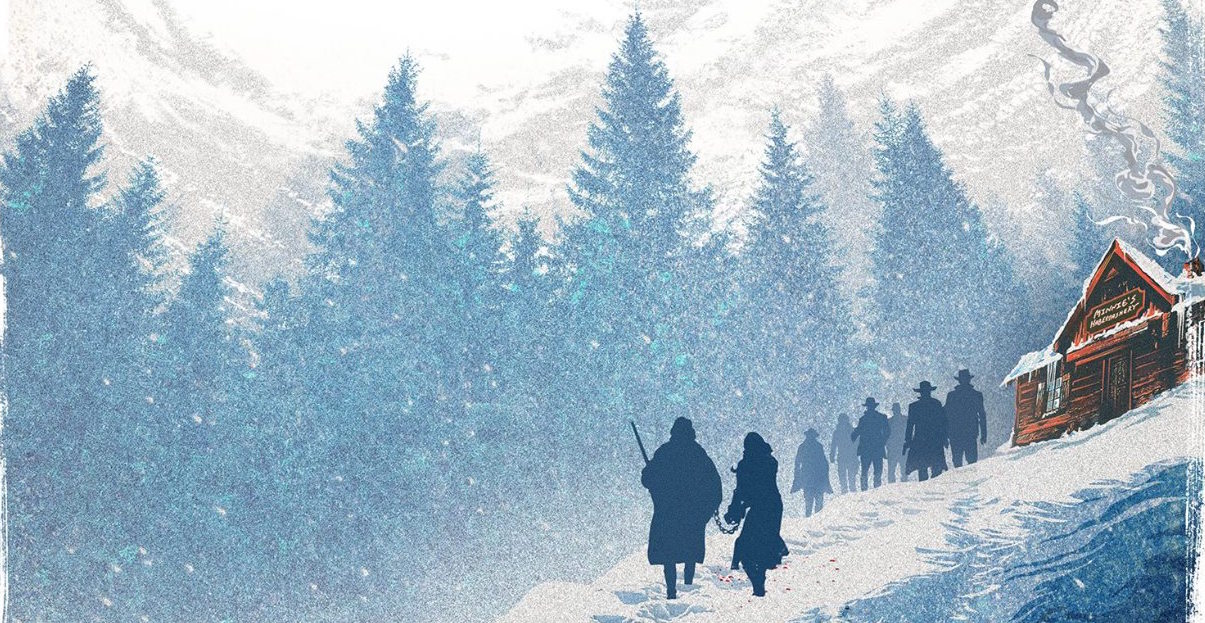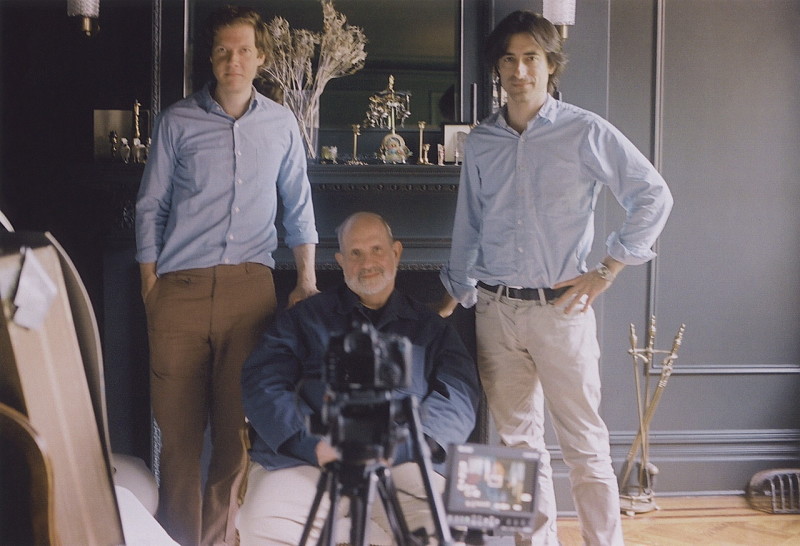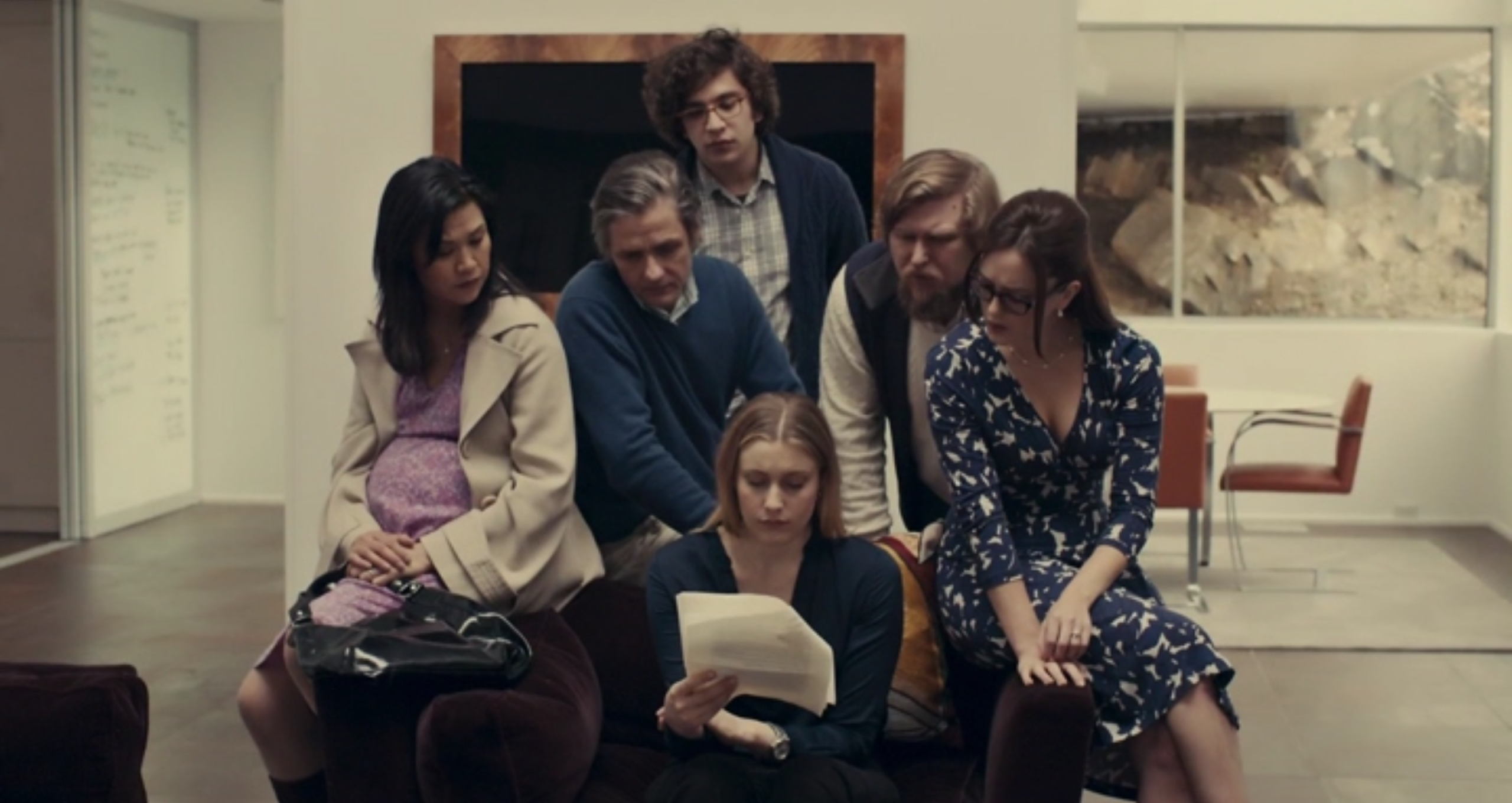












15 Contenders (alphabetically)
Remember when I said that my lists combined add up to a total of two Top 15 lists? Lie. Here is one more Top 15 list. This one reflects the up-runners, pulled from both categories. Many of these titles did at one point have places on my top 15 lists, but the more top-shelf cinema I devoured, the sadder I was to see films I considered locks trickle off the list. I look forward to seeing how the films on this list stack up in 15 years. As for films I was pained to give the bump (James White, We Are Still Here, Western, Room), I don't deny the possibility that time may cause me to regret my neglect.
To balance the films that I've spent a little more time writing about, random titles won't receive much soliloquy, even though they deserve it. Take The Big Short for example...
The Big Short
The Big Short has an excellent script, stellar direction, and features a knockout cast far more deserving of ensemble love than Spotlight. I don't think I'd buy it, but I'll definitely see it again and will likely henceforth stop on the TV channels where I catch it. And maybe when I'm old and grizzled, I'll look into my true love's eyes and say, “Really? You haven't seen The Big Short?!” Let's do this!”
Creep (pictured above)
Creep is a good example of why the North American theatrical release delineation feels wrong. This is one of my favorite films of 2014 and having seen it a year ago last March, it really doesn't feel like it belongs here. And so I'll let Creep take a dive in favour of two other productions higher on this list that have Mark Duplass to thank for their existence. Duplass is definitely one of two cinematic heroes of 2015 (more on the other later). Besides his great HBO program, Togetherness, as producer, Duplass brought to life two films off this list, one film off next year's, and a nutty if not disturbing animation jaunt called Animals. In total, all these projects add up to five of my favorite things considered 2015. Its' a pretty impressive spread.
I'm purposely not saying much about the mysterious Creep itself, which Duplass co-wrote, co-directed and starred in with up-comer, Patrick Brice, but suffice it to say, for a one-location, two-character horror flick, Creep is killer! It says a lot that Creep may be my favorite thing he's done.
You can read my interview with Duplass and Brice here.
The Experimenter
It's been a hell of a year for the 'unique biopic', as you'll see on this list, and The Experimenter might just be the most singular of the bunch. Peter Sarsgaard plays Stanley Milgram of the Milgram behavioural experiments. To borrow the film's tagline, “It's Shocking!” Note: that is not the film's tagline, nor is the film particularly shocking. Moving on...
I Smile Back
There isn't a laugh to be had in funny-girl, Sarah Silverman's foray into dramatic acting, I Smile Back. Instead, you get a bleak and chillingly real portrait of a woman battling with unprovoked depression and the effects that her psychosis has on her family. Silverman offers one of the best performances of the year.
It Follows
It Follows turned out to be one of the most polarizing films of the year. If you're against the film, you hate it all the more for how much people seem to love it. But if you're for it, you get the gift of the eeriest horror atmosphere produced in years... so you win.
Love
Compared to the existentially random rape of Irreversible and transcendent death of Enter The Void, the subject may feel pedestrian, but as anyone in love's throes can attest, the feeling is anything but commonplace. Thanks to Gaspar Noé's undiluted sense of nakedness, a theme sterilized by Hollywood has finally been stripped of its romance and given the raw, soiled approach it demands.
You can check my interview with Gaspar Noé here.
Love & Mercy
Love & Mercy also delivers as a biopic success story in its clever telling of the Brian Wilson meltdown. Both John Cusack and Paul Dano bring this film to life in ways I never imagined possible all those times I squandered opportunities to see the film at festivals or in theatres. My expectations of the genre have become that low. And yet, 2015 has raised some very interesting exceptions to the rule. Most notably from L&M writer/director, Oren Moverman, who rewrote the rules of the genre with my favorite example of the biopic's potential, I'm Not There. Another example is Ed Wood. Another is American Splendour. Or The Experimenter, which appears on this list.
Mad Max: Fury Road
“How dare I even mention Mad Max at all if not high on this list.' is a hypothetical reaction I envisioned when I decided not to include everyone's favorite film in my Top 15... As if to suggest, since I didn't adore Mad Max, I may as well have hated it. Well, I really, really didn't. Fury Road was excellent! I saw it twice and enjoyed the crap out of it both times. But I will say that I would feel fraudulent with a Mad Max poster on my wall. It's unearned. I am a great fan of action, but I never did look up to Mel Gibson as a true-grit lead. I do, however, admire the intelligent excitement of George Miller's comeback.
Mustang
Mustang plays like a Turkish Virgin Suicides, and an extremely charming one at that, despite its similarly bleak downward trajectory. It's a coming of age story unlike all that came before. And yes, I realize that I just compared it to The Virgin Suicides.
Son of Saul
Never has a concentration camp been cinematically depicted in such a deliriously frantic narrative fashion. The film is so adept at disorienting the viewer within its atmosphere of holocaust horror, it's no small relief Lorenzo spared us the 3D treatment.
Steve Jobs
Aaron Sorkin, the fast-witted, sharp tongued king of snark takes on the snarkiest American dreamer of our era. What's not to like? Besides Aaron Sorkin, the fast-witted, sharp tongued king of snark. But if snark were enough to warrant dislike, Steve Jobs wouldn't be the subject of idolization he continues to be. Sorkin's unromantic depiction of Jobs' interior life is a fast-paced treat.
Straight Out Of Compton
2015 saw its fair share of great films and movie's alike. Wonder-strokes like Mad Max, Star Wars, The Hateful Eight boldly define the common ground, offering the best of both worlds. A somewhat hammy biopic like Straight Out Of Compton also dips its feet in both categories, all the while managing to kick an exuberant amount of ass. It also happens to be the only biopic other than I'm Not There that I've ever seen more than once in theatres. SOOC is extremely watchable.
The Walk
3D is used to a truly dizzying effect in The Walk, but it would be but a parlour trick without Zemeckis' fine-tuned mastery of tension. From its trailer, it's easy to be skeptical, but, as it turns out, The Walk is one of the most surprisingly suspenseful films of the year.
What Happened, Miss Simone?
I know it has been a great year for the documentary, because, somehow, there's no room for the Nina Simone story on my list. For shame. Simone is among the all-time most interesting women in the history of performance art and this film only adds deeper layers to the complexity of her life and times.
The Wolfpack
A lot of us in the cinephile community feel as though we've been raised on, and to an extent, by, film. But even the most reclusive movie nut you know doesn’t hold a candle to the tragic upbringing of the Angulo bothers, or as they refer to themselves, The Wolfpack. Growing up imprisoned in their Manhattan apartment by their paranoid and deeply afraid of New York father, the boys’ only joy came from watching the cult films we all laud as favorites and each have our own personal relationships with. The difference is that these films, for them, were everything they knew about world at large. Now their lives are a movie and it's effing fascinating.
The Next 10: Documentary
These are the 10 films that follow my Top 5 documentaries from the main gallery, adding up to my 15 favorite docs of '15
(15) Soaked in Bleach
See Montage Of Heck
(14) The Ecstasy of Wilko Johnson
Inspired by his mate's amazingly brave attitude, Julien Temple's documentary shoots for nothing short of life itself in the punkest fashion. With its meditatively free-form editing, which borrows great sentiments on the grandiose theme from Bergman, Cocteau, and Buñuel, and a bevy of poetry from thinkers like Blake, Chaucer, and Milton, Ecstasy is an unpretentious middle finger to the reaper.
You can read my interview with director Julien Temple here.
(13) Drunk Stoned Brilliant Dead: The Story of the National Lampoon
Now, over 30 years after the death of Doug Kenney, National Lampoon may be gone - it may, to some degree, even be forgotten. But as anyone who sees DSBD can attest, the world was irrevocably changed for the better by its genius chutzpah, and I'm not sure I'd want to live in a culture without National Lampoon's profound impact. This is mandatory viewing for anyone who's serious about comedy.
(12) Station To Station
Station To Station is not only a poetic showcase of music and performance art, it is itself a performance that swallows a great variety of creativity into one electric organism chugging along the train tracks. The 21st century Festival Express happening is coming to your town to blow minds and party down. You don't need to wish you were there, the film is being there.
You can check my review here.
(11) Janis: Little Girl Blue
Speaking of Festival Express, the northern tour that featured the finest 3-way headlining bill possibly ever, for my 10 Canadian dollars of 1970 currency, no one on that train shone brighter than Janis Joplin aka 'Little Girl Blue' aka 'Pearl' aka 'Mama'.
Now, at long last, Janis, the outcast soul singer whose pipes of fire redefined what it meant to be a woman in rock, finally gets a respectful documentary, thanks to Amy Berg. It's easy to drop adjectives on giants of rock – revolutionary, prolific, blah, blah - but nothing other than experiencing Janis firsthand can honour the force of nature that was Joplin, aside from maybe the look on Mama Cass' face at Monterrey Pop '67 after Janis – possessed by an old black soul singer – dropped a bomb on the San Francisco scene. She had more balls than Otis and Amy Berg knows it well. Consequently, her doc portrait is a treasure.
(10) The Nightmare
No horror film will ever live up to the genuine terror one experiences during a nightmare. Many will try, but ultimately, the easier it is to wrap your head around a premise, the less chilling the film. And so it is without much surprise that Rodney Ascher's creepily mysterious follow up to Room 237, which takes 'the nightmare' as its theme - specifically as it pertains to the numerous individuals unfortunate enough to suffer from sleep paralysis, is the scariest documentary that comes to mind.
You can read my interview with Ascher here.
(9) Going Clear
The evil cult finally get theirs in Alex Gibney's eye-opening exposé. If just one person decides against handing over his/her life savings to this fraudulent cause as a result of Gibney's thorough digging, Going Clear has done its job. It's so good I do think it could make a difference... at least I pray.
(8) Amy
A matter of fact telling of Amy's beautiful rise to artistry and tragic fall to superstar elite. Fame threw out Amy's ambition to be a jazz singer/songwriter, instead demanding something far more sinister. The film is so effective at establishing her pure promise, it's absolutely crushing when celebrity culture poisons the well.
(7) Raiders! (pictured above)
Raiders! would make an interesting double with The Wolfpack in that they both involve fan films wherein friends bond through recreating their mutual favorite movie. On account of its impressive detail, Raiders is considered the best fan film ever made. It's Gus Van Sant's Psycho (but not really), in that Raiders! is a shot by shot remake with the effects replaced by imagination and sketchy explosives. Not only is the film a great tribute to Raiders Of The Lost Ark, but the kind of love for film that can only happen in your most imaginative years. Raiders! comes full circles when the gang, now in their adulthood, reunite to complete the only scene they failed to shoot during the film’s 80s production.
(6) Montage of Heck
It should certainly strike some as suspect that I have two very different Kurt Cobain docs on the same list. Brett Morgan’s Montage of Heck and Benjamin Statler's Soaked In Bleach sing very different tunes. One is your more standard adulation piece that, despite its claims at objectivity on account of its hard-to-watch home videos, loves Kurt more than it lets on. The other is an investigation of his suspicious 'suicide'. Theories of this nature are easy to condemn as tasteless and I’ve never given them any weight before, so imagine my surprise when I found Soaked In Bleach getting through to me.
The film raises some very real questions, for which the public answers are very unsatisfying. And while most would prefer to view such a film as crass and irresponsible, Soaked In Bleach's thought out analysis will have you questioning the responsibility of ignoring the subject, as the police at the scene of the crime certainly did.
The two films make for a fascinating double bill, considering the he said / she said juxtaposition of accounts. In the above still for Montage, which its publicity department provided to the media among its primary stills, we see a rare shot of Kurt offering a genuine smile to its photographer. The photographer is Courtney, and though she stayed out of Brett Morgan's way during production, his film was sanctioned by her and is thus inherently through her lens. If there's any truth in what Soaked In Bleach suggests, and I think most people of logic will find plenty, Montage of Heck is the year's most convincing propaganda film. It's also the best.
The Next 10: Fiction
(15) Cop Car
A master class in suspense screenwriting, Cop Car begins with an intriguing situation and manages to build on it in delightfully shocking ways. A classic thriller with a humorous twist.
(14) The Revenant
A few days ago I unintentionally had a western quad day (well, it started unintentionally): The Hateful Eight (third screening) --> Slow West --> The Revenant --> Bone Tomahawk. 2015 has evidently seen its unique share of entries into the genre, and while they all offered fresh angles, something about the survival anti-western, The Revenant's floating camera, capturing the severe but scenic action from all angles within the same shot, resonates as one of a kind. It may feel thin to some, but there's a quiet beauty to a man being tossed around by nature, powerlessly floating down its streams and surviving its waterfalls... that is, if the lost man is determined enough. Leo doesn't have to say much when his motivation is apparent by his outrageously improbable survival.
(13) Star Wars
What does it say about The Force Awakens that I refreshed my memory by watching the original trilogy, not for my first screening, but for my second? I realize that you don't make friends by disliking Star Wars, but I must say, revisiting Episodes IV-Vl in one shot after years and years away left me lukewarm. There must be a reason the trilogy didn't stick with me after childhood, whereas trilogies like Indiana Jones did in significant ways, and I think it has to do with my view that beyond the beauty of the premise – the inspired concept of an intergalactic period piece (a long time ago in a galaxy far far away....) - they're not particularly well executed movies. Despite appreciating the Amblin sensibilities he brought to Super 8, I'm not exactly a fan of JJ. Abrams, but somehow I do think he's proven himself to be the best director the franchise has seen. Lucas is an unquestionable genius for initially realizing his massively inventive world, but the films always lost me at their pacing.
All that said, my question for gripers who are angry with the amount of recycled elements, if The Force Awakens is aimed purely at fans, then why do I love it so much? Because it's giving me what I want? Well... yes! If what I want is a damn good movie. It uses the elements of old in an understanding way that honours the imagination of Star Wars without ripping it off. To fault JJ. for resurrecting themes like lineage is to grossly misunderstand that the Star Wars epic, is at its core, a family opera. And isn't offering a new plot, while still keeping with the beloved vibes of old, exactly what a sequel is supposed to do? The Force Awakens does the crap out of sequels.
(12) A Pigeon Sat on a Bench Reflecting on Existence (pictured above)
...And if that pigeon were to watch any one of the hysterically absurd scenarios of Roy Anderson's final instalment of his human trilogy, what might it deduce of the experience of life on earth for us humanoids? Among other thoughts, the pigeon would likely find our species to be both tragic and confusing in its comically laugh-less search for happiness. Though, on the surface, everyone is 'doing fine', inside, no novelty party prop can counter the lonely interior of this thing we call living.
(11) Manson Family Vacation
The word family is an integral point of discussion in J. Davis' film, Manson Family Vacation. Like so many others captivated by the horrific events as spelled out in prosecuting attorney, Vincent Bugliosi's, true crime tell-all, Helter Skelter, Davis has clearly spent a substantial amount of his life attempting to wrap his head around the motivation of late-60s runaways giving up their homes to live in psychedelic awe of a psychotic guru. Who knew a film about Manson worship could be so tender?
(10) Tangerine
Tangerine is like that DIY band that blows open the doors of feasibility for under-skilled musicians, offering the inspiring insight that production value isn't the key to communicating a voice. For filmmakers, Tangerine, shot on an iPhone 5 with an attachable mini-lens gizmo, is an invaluable illustration that the essential ingredients of cinema have far less to do with the gear than most give credit. If what you put in front of the camera is gold, the rest will follow suit.
(9) Inside Out
The most emotionally educational film I've ever seen - period. Also I feel it would be dishonest not admitting that this film made me blubber like an infant. It was humiliating.
( 8) Entertainment
The breathy construction of Alverson's exquisite frames serve to offer the audience a viscerally dreamlike road film through the outskirts of sanity - a hellish confrontational vision of an American existential nightmare. His show business apocalypse may be chock full of contempt for the premise of entertainment, but that doesn't make Alverson's odyssey of a broken clown any less watchable. Whether or not he's explicitly making this point or not, in Entertainment , one man's nightmare is another audience's gold. And make no mistake, Entertainment is gold.
My interview with director, Rick Alverson
(7) The Overnight
Complete with a poster that puts the 'ass' in asterisk, the glorious advertising campaign of Patrick Brice's new sex-romp, The Overnight, is designed to let the imagination run wild. It's so incredibly tempting to reveal all the bizarre places Patrick Brice's new film, The Overnight, takes its audiences, who, if they're anything like this viewer, will likely watch the film with mouths gleefully agape.
My interview with director, Patrick Brice and star Jason Schwartzman
(6) Carol
Haynes approaches the material with an utmost romantic elegance, wherein a glance has the ability to communicate as much weight as a sonnet, thanks to the powerhouse performances of Blanchett and Mara. With stunning cinematography and art-direction echoing the grace of its characters, Carol is a pivotal addition to the cinema of love, as defined by genuinely romantic, emotion-fuelled films such as David Lean's Brief Encounter. Much like Lean's film ceases to age on account of its central truth, Carol deserves to stand the test of time.
Top 10 Films of 2015 (mixed)
(10) The Seven Five
A remarkable account of police corruption in the crack-ridden streets of '80s Brooklyn, with more grit than all the Serpicos and Prince of the Citys combined. The 75th precinct was one of the roughest turfs in America and, in the madness, the line between cop and perp shrank every passing day. Eventually, power and greed grew to be irresistible forces and many cops of the neighbourhood's surrounding districts succumbed to illegal temptations. As for the hellishly located seven five district, the most severe cop gone Cagney was a fresh face named Michael Dowd
It's a true crime story Scorsese would be lucky to get his hands on, and even if he could, his telling probably wouldn't hold a candle to Tiller Russell's documentary. Thirty years have passed since Dowd went Scarface with a badge, and with the benefit of time, The Seven Five is able to offer a firsthand retrospect so captivating, you'll be grateful to learn of its existence.
(9) Phoenix
Phoenix is as much about betrayal and heartbreak as it is the direct aftermath of genocide, via post war noir. The film follows the shadowy concentration camp homecoming of Franny, who wants nothing more than to be reunited with her non-Jewish husband. Little does she know, it was he who turned Franny in to the Nazis. When the two do reunite towards the end of the first act, Frederic, clouded by his suppression, refuses to believe his own eyes and takes her for a Hitchcockian doppelganger. With powerfully understated performances driving the film's classic Hollywood grace, Phoenix is an utter knockout.
(8) Finders Keepers
In Finders Keepers, two grown men take part in a vicious custody battle over the rightful owner of one of the men's severed leg. If this one-line synopsis isn't enough to pique your interest in this film, then I just don't know what's wrong with you. Unless of course you're hyper sensitive to the exploitation of Jerry Springer types. If so, I should also add that Finders Keepers turns out to be one of the unlikeliest films I've ever been deeply moved by.
You can find my review here.
(7) Anomalisa
Anomalisa took root at composer, Carter Burwell's, Theatre of the New Ear - a series consisting of one-acts that could also be described as "sound plays". In initially accepting Burwell's experiment - his aural challenge - Kaufman's mission was to find a theme in which the medium served its message. His answer came from the disconnection inherent in the process of separating sound from instrument, mind from body.
The adaptation Kaufman co-directs with Duke Johnson, a stop-motion artist who helped guide Kaufman through the animated wilderness, is a seamless extension of Theatre of the New Ear's mission to serve the message with an expressionistically apt medium. In the play, the actors sit on opposite sides of the stage, providing the soundscape with two disembodied personas. In the film, the characters' bodies may stand in close proximity to one another, but their voices come from a faraway world called reality. Whether Michael's body likes it or not, it is a slave to the powers animating and voicing him. Besides being utterly fascinating in its experimentation, it’s also a beautifully lonely depiction of connection, disconnection, and intimacy.
You can read my interview with Kaufman and Johnson here.
6) The Look Of Silence
If you told me after I saw The Act of Killing that there would ever be a doc capable of dropping my jaw as low to the ground, I'd have been very skeptical. And yet, only one year later, Joshua Oppenheimer releases its companion piece, The Look Of Silence. Rather than focusing on Killing's killers, Silence follows the grown up son of a victim of a public execution during a “comunist purge”. Thirty years after his father's brutal slaying, the man works as a travelling optometrist. When this man first saw his fathers' murderers glorifying their genocide through heartless re-enactments in Oppenheimer's first film, The Act Of Killing, he was prompted to confront the beasts who traumatized and destroyed his family. The Look Of Silence may contain the most intense scene you've ever seen in a documentary.
(5) Wild Tales
Earlier this year, I got into my first fender-bender in over 10 years. In a minute I went from being a touch low on funds to owing a stranger over 1000 US dollars. It was enough to make me crack. But I didn’t. Instead I went to see Wild Tales for the second time and somehow, afterwards, throwing that sizable sum in the garbage no longer felt like the end of the world.
Such is the power of watching all the wonderful characters of Wild Tales fall to shambles, one by one, in a variety of ticklingly frustrating and often violent circumstances. With six shorts, it's easy to play favorites, but even the least strong short is brimming with comedic, stylish brilliance that plays an instrumental role in adding to the erratic whole. When Wild Tales is at its best, few things are wilder.
(4) Junun
In Anderson's first documentary, Junun, a light on its feet document of a recording session in Rajasthan, India, led by Israel's Shye Ben Tzur, featuring Jonny Greenwood and a 20-piece powerhouse Indian band called The Rajasthan Express, audiences are treated to another, more observant side of the PTA aesthetic.
Although upwards of five cameras were utilized simultaneously during the Junun sessions, one can still feel the silent presence of the documentary's director watching the proceedings with an eye that can't help but translate itself cinematically. From the first shot - an unfathomably calculated 360 degree pan around the musician circle - it's clear that any preconceived notions of what music documentaries tend to look like are useless. There isn't a great deal of talking and when speech does occur, there are far better things to discuss than the music itself. Song after song, the blasts of music do a far better job of speaking for themselves than any commentary could. The sudden silences that follow each symphony's final note are pregnant with a lingering energy that trails off into a space where words fail.
(3) The Hateful Eight
Even after three viewings, The Hateful Eight is still the most watchable murder mystery civil war western of the century. That may not be saying much, but it does speak to the uniqueness of Tarantino's chamber vision. It's like he took the tavern showdown of Inglorious Basterds and stretched it out into three hours. Or if you prefer, it's like he threw Reservoir Dogs in a time machine and hashed out its modern west in the real west. Your typically classic western gives you one stranger – the man with no name. Tarantino's western provides eight of them. Watching them work out their grievances, within the sprawling frames of Q's widest screen to date to the sounds of Morricone's epic orchestra, is nothing short of baring witness to a cinematic extravaganza.
One thing that is clear with Tarantino's eighth film, is that, at this point of his widely beloved career, the director’s reputation precedes him. Every one of the millions of people who see this film will do so with a different set of eyes. The vast majority of those people bring with their attendance an opinion of its auteur. How greatly this will or won't influence people's individual impressions of the film is a question I find myself wondering more than a little. Or, to put it another way, how would this film be received had it been released in 1990? Or if it were released this year, but it was Q's first film? I'm pretty sure I'd love it at least as much as I do now, if not significantly more.
(2) DePalma
This spot may have easily gone to New York Film Festival programmer, Kent Jones' similar meeting of the artistic minds, Hitchcock/Truffaut, but I refuse to watch this thorough exploration until I feel I've seen a more complete account of Hitchcock's filmography. And so I'm doing a bait and switch with the NYFF title, DePalma, which more accurately belongs on next year’s list by my own constraints. Given that DePalma was a student of Hitchcock and Baumbach, a student of Truffaut, I'm going to allow it. Thanks!
Noah Baumbach and Jake Paltrow's documentary, DePalma, begins with its beloved subject discussing the first time he ever saw Alfred Hitchcock's Vertigo and the profound impact it had on his sense of storytelling and general cinematic philosophy. In discussing Hitchcock, an interesting point is raised; that for all the talk of the Hitchockian influence, Brian De Palma remains his only true disciple. Nowhere else in the cinema of suspense are Hitchcock's expressionistic lessons in anticipation so well heeded and stylistically expanded upon.
Though Baumbach and Paltrow's voices are not heard in the film, their presence is detectable through the light in De Palma's eyes, transforming him into the type of raconteur most are only accustomed to listening to in intimate circumstances. With such a comfort, not only are they able to get a spirited first hand telling of De Palma's career, but an equally earnest discussion of his failures without a hint of defeated ego. "Every single cut you make will look at you forever", De Palma says of the eternal nature of the filmmaker.
(1) Mistress America
The real reason I made an allowance for DePalma as a 2015 film is to demonstrate the cinematic success of Noah Baumbach’s year. Though I didn’t especially care for his last release, While We’re Young, I do consider myself a longtime admirer of his work. I make this point to emphasize how remarkable it is that Baumbach has delivered two of my favorites of his films within the same year, somehow ruling both documentary and fiction categories. I went back and forth between Mistress America and Hateful Eight for my front runner of the year, and what it eventually ended up coming down to was this: Is my 5th favorite Tarantino film better than my favorite Baumbach film? I'm happy to conclude, it is not.
For all my love for Baumbach's finest hour, I’m having difficulty putting my admiration into words. It has a great deal to do with the film’s hysterical screwball second act, exercising more command over the classic genre than Peter Bogdonovich’s wildest dreams. It certainly has to do with the stylish editing, which functions in perfect synchronicity with my second favorite score of the year - an almost retro-modern take on the lure of the urbane Manhattan lifestyle. And let’s not forget the onscreen performance of Dean Wareham, who along with his wife, Britta Phillips, provides the film's 80s synth score. He's also highly revered in the college rock world for his fronting indie greats, Galaxy 500 and Luna. In Mistress America , Wareham gets rich laughs as the cloyingly nosy neighbour adding to the cacophony of the madcap scene Gretta Gerwig as Brooke wreaks on the quiet rich home.
But above all, the real star of the show is Gretta Gerwig, who not only dominates the screen with her faux-cosmopolitan air (this film almost makes a better case for why Gerwig belongs in a Whit Stillman film than Damsels in Distress), but also charms the screenplay with her large personality and Brooke-like philosophies, making the film's priceless protagonist lovably flawed. Say what you will about the realism of Brooke's dreams, through the eyes of her protégé/step-sister, we love her for her audacity to strive for greatness.
Gerwig is no one-trick-pony. Not only is the script sprinkled with quotable dialogue, but it gives a name to the beautifully doomed. Outside observers/writers, like Brooke's protégé, or even Gerwig/Baumabch as screenwriters, draw their own conclusions about the image of success Brooke projects vs her underlying truth. They may be her reality check - and a hard pill to swallow at that - but ultimately, the story is Brooke's to tell. The largeness of her fake-it-till-she-makes it spirit is so contagious, you want things to work out for her, but deep down you worry that Brooke may be one of those people who deserves so much more than she'll ever get. In the end, it's the same protégé’s unwelcome 'fictionalizing' that offer's Brooke her poetic saving grace - the profound silver lining to her bleak fate, offering beauty to her tragedy.

More about Mistress America
Around the Internet
Recent Posts
Friday One Sheet: LIVING THE LAND
Now Playing: BLADES OF THE GUARDIANS and Some Other Movies
Leading Voices in Global Cinema
- Peter Martin, Dallas, Texas
- Managing Editor
- Andrew Mack, Toronto, Canada
- Editor, News
- Ard Vijn, Rotterdam, The Netherlands
- Editor, Europe
- Benjamin Umstead, Los Angeles, California
- Editor, U.S.
- J Hurtado, Dallas, Texas
- Editor, U.S.
- James Marsh, Hong Kong, China
- Editor, Asia
- Michele "Izzy" Galgana, New England
- Editor, U.S.
- Ryland Aldrich, Los Angeles, California
- Editor, Festivals
- Shelagh Rowan-Legg
- Editor, Canada


